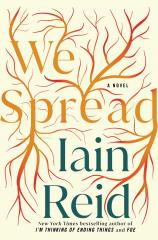We Spread
Review
We Spread
Iain Reid, author of the international bestseller I’M THINKING OF ENDING THINGS (now a Netflix film) and FOE, returns with WE SPREAD, a genre-defying, sparse and uniquely haunting novel about the most unbeatable, unavoidable horror of all: aging.
Penny, an artist who has never formally shown her work, has lived in the same apartment for decades. She once shared it with her lifelong partner, a fellow artist of significant acclaim. But since his death she has lived alone, the days rolling by without pomp or ceremony, only the aging of her body to show that time has passed. Penny knows that her skin is more wrinkled than it once was, her eyes weaker and her knees stiffer, but she still feels that her mind is sharp. Sometimes she forgets a detail or leaves a vegetable out too long, but those kinds of things happened to her even when she was young. Still, she is aware that with age her memory will weaken, so she has started leaving notes to herself around her apartment, stuffed into books, shoved into cardigan pockets and pinned to her refrigerator. Often they are helpful reminders, but sometimes they are more ominous --- proof that she truly has started to slip.
"With a gripping premise and a haunting conclusion, this contemplative, elusive novel feels as intimate as a memory and as terrifying as a nightmare. Iain Reid has done it again."
Penny begins hearing voices in the apartment next door, but when she questions a maintenance man about the tenants, he tells her that it’s vacant. Still, the voices come, and one night she spots a hooded figure watching her from across the street. Are these sensations real, or the product of her bored, lonely and failing mind? A bad fall answers the question once and for all. Penny can no longer live alone, so her super, Mike, takes her to Six Cedars, a long-term care residence that he claims she and her partner picked out and paid for years ago. Six Cedars, he explains, has always been her plan for the inevitable, and the fact that she cannot recall it proves that it’s time. But she would remember a choice like this, wouldn’t she?
When Penny arrives at Six Cedars, she is taken by the lush forest that surrounds the old home. It’s not a sterile place by any means, but a real country-style house --- an obvious upgrade from the cold, filthy, uncaring facilities she has dreaded for so long. But she is surprised to learn that Six Cedars has only three other residents, plus two staffers, Shelley and Jack. Everyone looks clean, cared for, aware and engaged, but Penny still struggles with her loss of freedom and routine. Group sessions with the other residents, the hint of a romantic spark with a logical man who resides there, and decadent, filling dinners soon start to sway her. But despite feeling like part of a whole for the first time in a long time, Penny cannot help but notice that the days are slipping away from her, and much faster than they did at home.
As Penny becomes more and more disoriented --- “You love sitting in that chair,” Shelley claims, as Penny looks at it for the first time --- she begins to paint again, but even her ability to lose herself in art feels slippery, almost dangerous. Shelley’s controlling side starts to emerge, but with a home full of aging residents whose memories cannot be trusted and who are prone to paranoia, it becomes difficult to distinguish the real-life horrors from the more fantastical ones. Is Shelley’s control of them malicious or protective? Are they all being betrayed by their memories and stifled by their care, or is something much, much darker going on here?
The mystery at the heart of Six Cedars is riveting and troubling. Although Reid never provides any sure answers, his control of his characters and their fears is so assured and confident that even when you feel utterly clueless, you find yourself contemplating ideas you never found approachable before. There’s no resolution to Penny’s crisis, yet his delivery of her fears is almost comforting, a blink-and-you’ll-miss-it sense of satisfaction that leaves you feeling totally unmoored yet strangely peaceful. He plays with the ideas of memory and isolation beautifully, highlighting both the very real fears of being forgotten and ignored and the creeping sensation that something sinister can be happening right before your very eyes, even when your perceptions can no longer be trusted.
With a gripping premise and a haunting conclusion, this contemplative, elusive novel feels as intimate as a memory and as terrifying as a nightmare. Iain Reid has done it again.
Reviewed by Rebecca Munro on September 30, 2022
We Spread
- Publication Date: May 30, 2023
- Genres: Fiction, Psychological Suspense, Psychological Thriller, Suspense, Thriller
- Paperback: 304 pages
- Publisher: Gallery/Scout Press
- ISBN-10: 1982169362
- ISBN-13: 9781982169367




